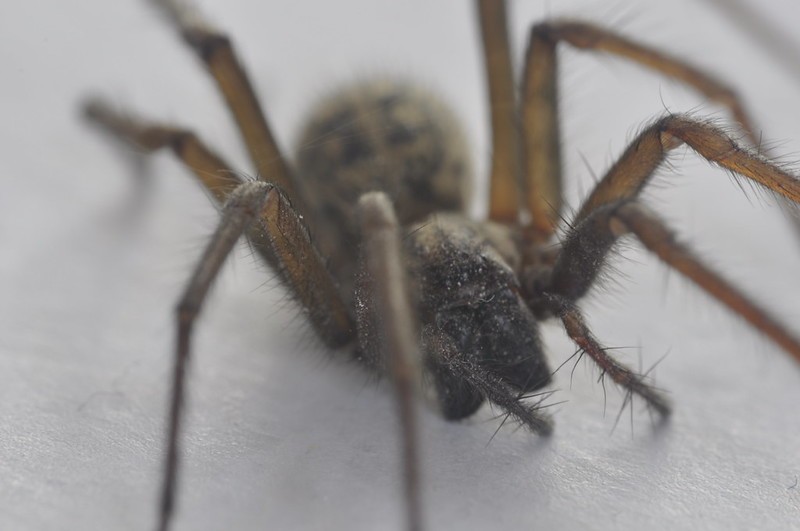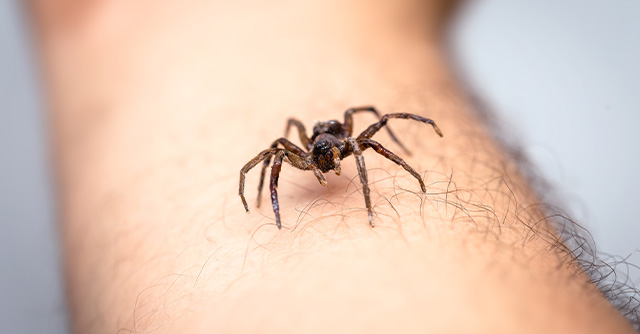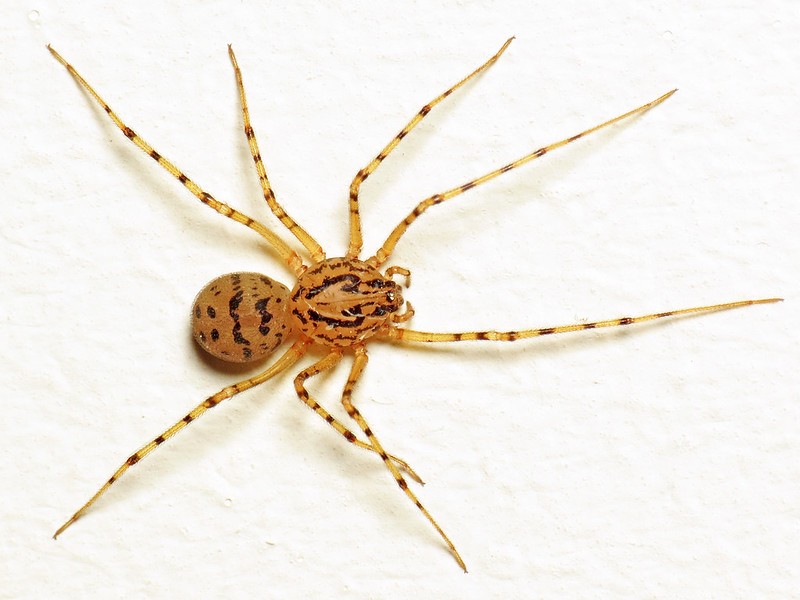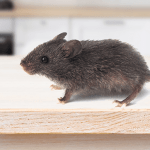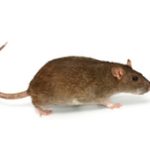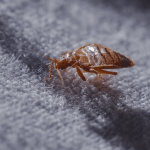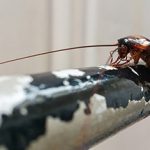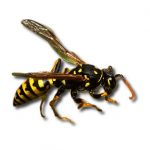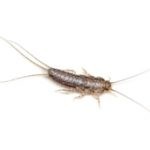Common Garden Spiders in the UK
Are you fascinated by spiders and want to know about the most common ones that can be found in the UK? Well, this post is just for you then, as we’ll look into some of the most popular spider species that you can come across predominantly in your garden or occasionally in your home.
Read on to see how to differentiate the mouse spider, for instance, from the wasp spider in a matter of seconds. In addition, you’ll also learn that common British garden spiders are rather beneficial, so think twice before you start going on a spider-killing spree in your garden shed.
British Garden Spiders
There are numerous different types of spiders in the UK. The most commonly encountered ones in gardens and homes are the following:
Garden spider
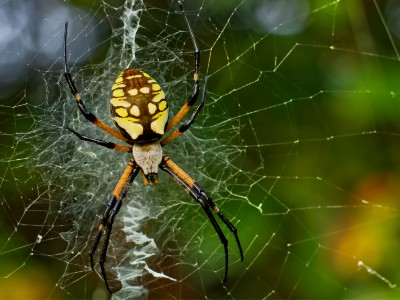
Garden spiders are actually the most common spider species in the UK. This is a very easily recognisable spider. Its colour may vary – from yellowy-brown to dark brown, but it has one unique characteristic – a white cross-like shaped group of spots on its abdomen. As the name suggests, garden spiders are usually found spinning orb webs on branches, hedges, garden fences, inside garden sheds, etc. They use their webs to catch their prey – flying insects.
Cave Spider
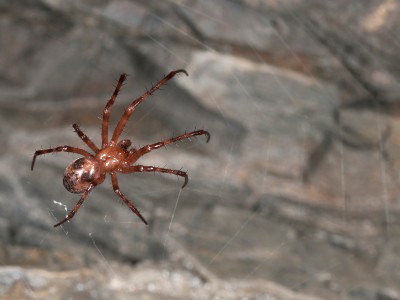
This is also a type of orb-weaving spider. There are two types of cave spiders – Meta menardi and Meta Bourneti. Both of them are widely spread across the UK all year round. Interestingly, cave spiders are among the biggest spiders in the Kingdom – between 10-16mm. Female spiders are bigger than male ones. Spiderlings are attracted to sunlight, which is how they acquire new territories, while the adult cave spiders are photophobic, meaning they prefer dark spaces, such as cellars, caves and tunnels. They feed on woodlice, flies and other small insects.
Mouse Spider
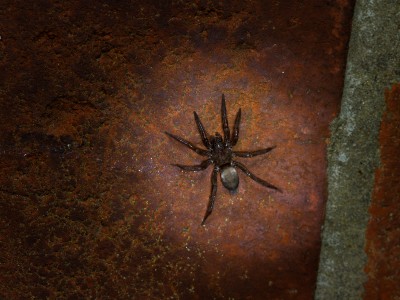
Scotophaeus blackwalli or the mouse spiders are widespread in the UK and most often seen in the summer and autumn. They are 9-12mm in size, with females again being bigger than the male ones. Regarding their habitat, they prefer to hide under tree bark, inside houses and sheds, as well as in holes in walls. Mouse spiders have silver-grey hair covering their abdomens, very similar to that of mice – thus, the name. They are nocturnal and hunt at night, with their main target being invertebrates.
Daddy Long Legs
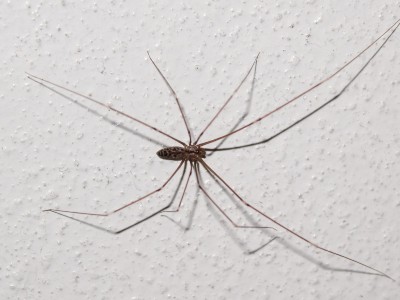
They are part of the Pholcidae family. Daddy long-legs are also commonly referred to as cellar spiders. Unsurprisingly, they could be seen in cellars, at ceiling heights, and in caves. These spiders are normally around 10mm in size. The male ones live for about two years, while the females could live up to three years. They feed on small invertebrates. The females carry their eggs in a loose bundle. Depending on the conditions, they could hatch in about four weeks.
False Widow Spider
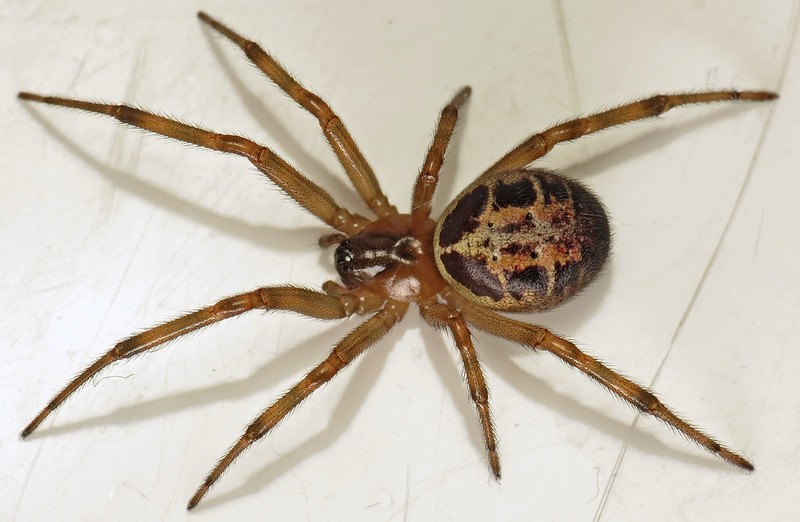
Steatoda nobilis, also known as a false widow or noble false widow spider, can be seen all year round in many parts of England, but mostly in the southern counties. Their size can range from 7mm to 14mm. They live in houses, sheds and other outbuildings, but also inside rabbit hutches. False widow spiders feed on flies and other small insects. They are web-weaving spiders with shiny dark bodies and two pale indentations on their abdomen. As the name suggests, these spiders resemble the black widow spiders in appearance and the two species have been frequently mistaken in the past. Read this article to learn more about how to differentiate the two spider types.
Four Spot Orb Weaver
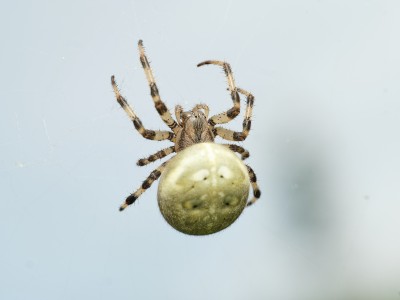
While varying in colour – yellow, green, orange, red or brown, the four spot orb-weaver has 4 visible spots on their abdomen. This is, unsurprisingly, where they got their name from. The females can reach up to 15mm in size which makes them one of the biggest spiders in the UK. They are usually found in tall grasses, bushes and hedgerows. These spiders feed on small insects by catching them in a thick web.
Wasp Spider
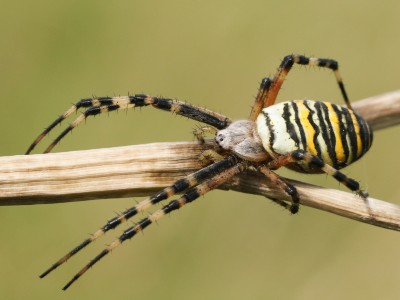
This is a species of orb-web spider, which is widely spread across the UK. The wasp spider has a very distinguished look, with black and yellow marks on its abdomen, resembling the pattern and colour of wasps – thus, called wasp spider. You can also recognise them by their web – it is usually a common orb-web but with a single zig-zag pattern of silk running through the centre. Interestingly enough, the male wasp spider can reach about 4-6mm, while the females can be up to 15-17mm. Unsurprisingly, they also feed on small insects. Similarly to garden spiders, wasp spiders are most often found in grasslands.
Do Common Garden Spiders Bite?
Not really! Garden spiders are not very interested in biting humans. They do have venom, but they only use it to catch food and not to hurt people. Unless you go out of your way to irritate one by picking it up, for example, you’re unlikely to be bitten. Even if you do, it’s nothing to be concerned about – it may feel like a bee sting, with some redness or swelling, but it normally resolves fast.
How Long Do Garden Spiders Live?
Garden spiders have rather short lives. They usually live for about a year. The female ones normally die in the first frost, while the male ones die after mating. With a little bit of luck and the right temperature, the females may live for several years, however, the same does not apply to the male garden spiders.
What Happens to Garden Spiders in the Winter in the UK?
Most of the adults UK garden spiders pass away in the colder months, as we already established, but they ensure the next generation is safe before they go. The females hide their eggs from the cold and any hungry predators in silk sacs. In springtime, the small spiderlings hatch and begin to spin their own webs, prepared to resume the cycle all over again.
Your property is infested with spiders?
A spider exterminator will assist you against the intruders!
What Do Garden Spiders Eat
Garden spiders are not picky eaters – they will eat pretty much all kinds of insects, such as grasshoppers, flies, bees, mosquitos, wasps, etc. Actually, this is why garden spiders are considered beneficial. They keep the insect population in your garden or backyard in control, thus protecting you, and your plants and crops. Similarly to most other spiders, they weave their web in a large circle, wait for their prey to get trapped and then bite it to inject its venom.
How to Get Rid of Spiders in Garden
If you cannot be convinced of the benefits of garden spiders or simply have too many of them in your garden, there are a few ways to help you get rid of them. Here are the most effective and frequently used ones:
Natural Repellents
More and more people nowadays prefer to use more natural and eco-friendly alternatives to everything, including getting rid of spiders. The most basic thing you can do is regularly trim and tidy overgrown bushes and plants and make sure there is no dead wood or leaves left out since these are some of the main habitats of spiders. Regularly removing any spider webs you find can help drive garden spiders away.
Herbs and essential oils also might just do the trick. Some of the spider-repelling herbs include eucalyptus, lavender, tea tree, peppermint, cinnamon, cedar, citronella and citrus. You can either use small sachets of these herbs and place them around your house and garden or concoct a homemade spray. If you prefer, you can plant spider-repellent plants around your home, such as lavender, lemongrass, mint, lemon balm, lemon verbena, eucalyptus and so on.
Check also: Spiders and Conkers Myth: Do Conkers Keep Spiders Away?
Chemical Treatment
Using the right pesticides can make the process of controlling or exterminating garden spiders quick and easy. However, if not done correctly, it may have harmful effects on plants, animals and even humans.
Professional Spider Control
Probably, the easiest and safest way to keep a pest-free environment is to hire the help of a professional spider control exterminator. Fantastic pest control technicians can assist with a wide range of pest problems. They will inspect and estimate the type and level of infestation and proceed to treat the premises using the most effective method, ensuring the safety of your family and pets.
Takeaways
As we’ve learnt, there are multiple different types of spiders across the UK with a variety of garden spiders being rather common, as well. Before proceeding to fully exterminate the spiders around your home and garden, you should consider the benefits they have to offer. After all, gardens are the natural habitat for these spiders and it’s possible that they will return again in the future. There are a lot of DIY ways to keep garden spiders at bay or kill them, however, hiring a professional will save you a lot of time and effort.
Need professional help to deal with a spider infestation?
Keep in mind that we only aim to provide some useful information about garden spiders in general. We cannot guarantee that the arachnids you’re dealing with corresponds to the same description and are exactly the same.



